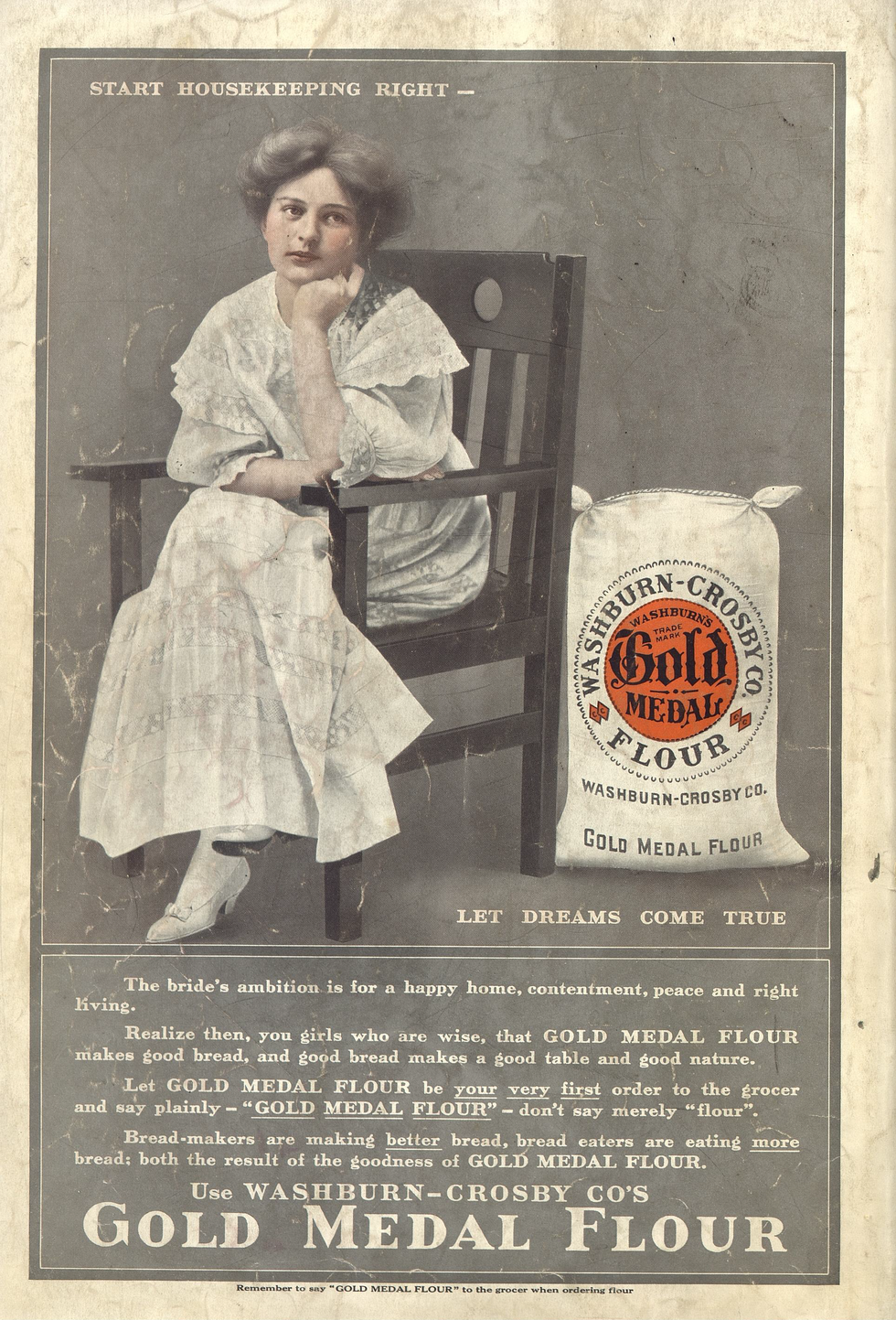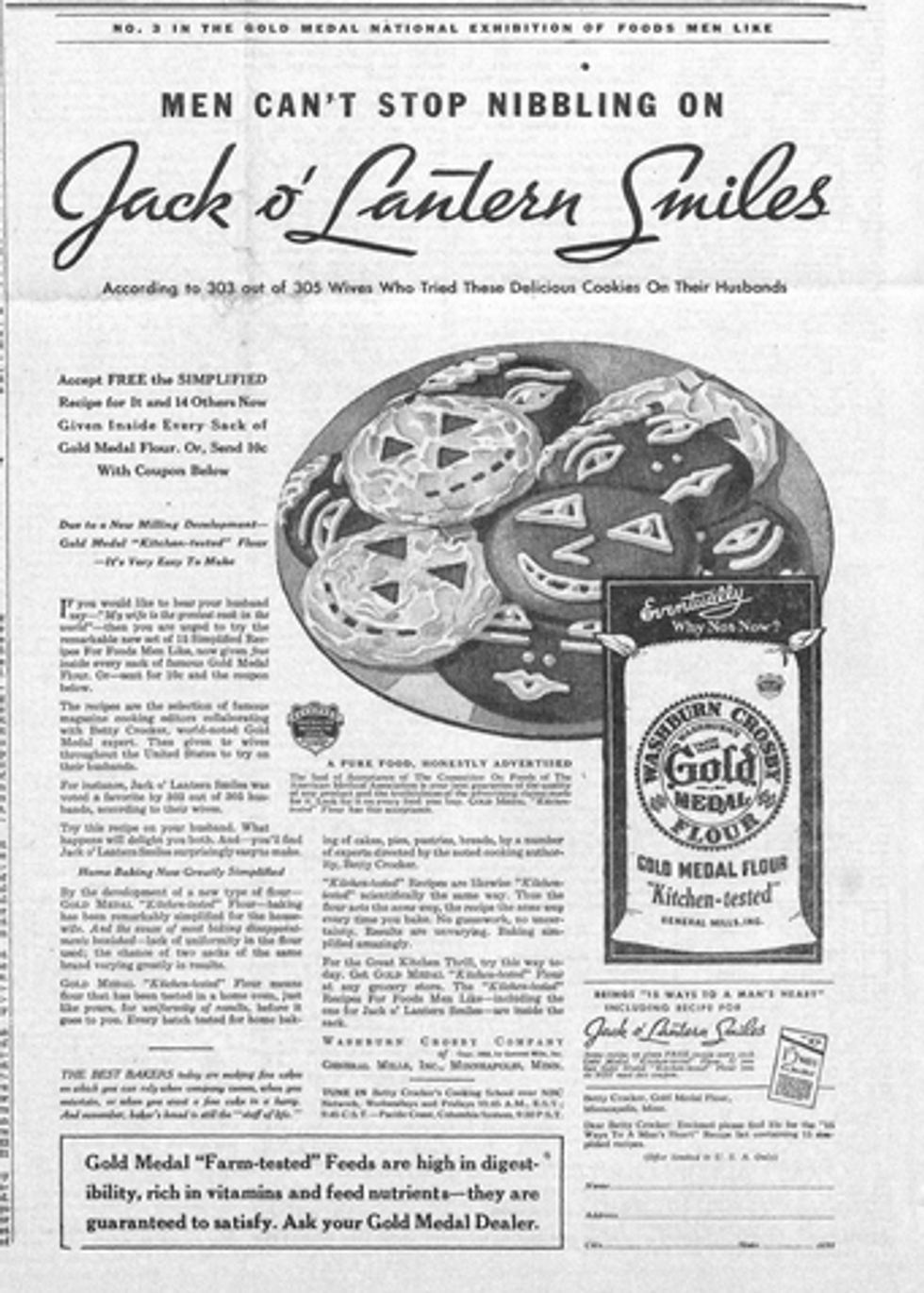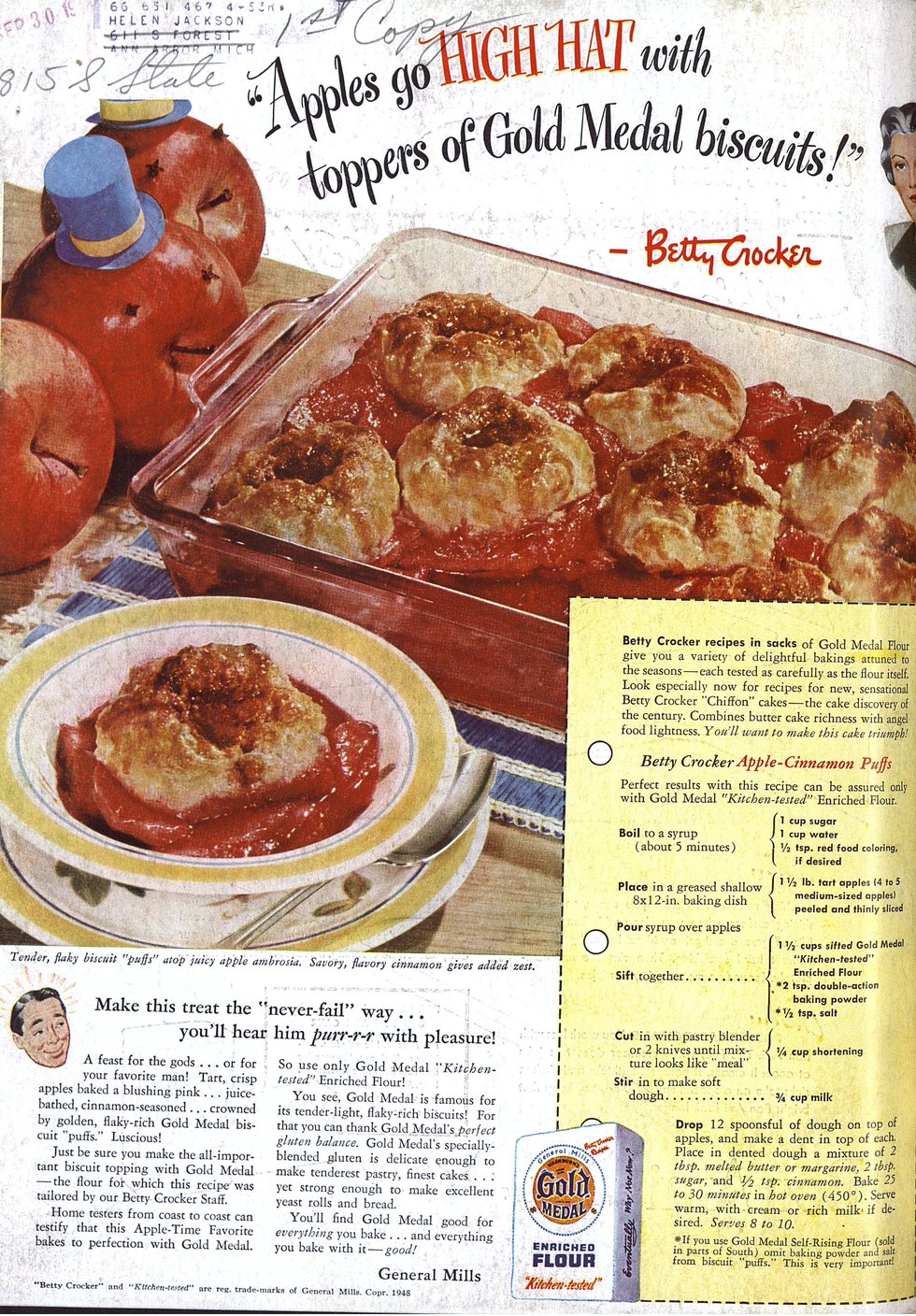Flour is perhaps the most basic of baking ingredients. It is so neutral of a product that it is hard to believe that something as basic as your average pound of flour could be gendered in any sort of way. To think that, however, is apparently incorrect. As it turns out, there are so many ways in which any food can be gendered and it is all relative the societal culture. I had the opportunity to take a course at Indiana University called “Food, Sex, and Gender,” in which my professor spent half a semester explaining how sex and gender influence how we perceive food. I did not have high hopes for the class when registering but I was pleasantly surprised at how intriguing the whole idea of "gender-ing" food is. One of the most interesting things to me was seeing how brands advertised their food towards what demographic, all in relation to the gender norms of the time. Let’s take Gold Medal Flour as an example.
When the Washburn-Crosby Co., an early form of General Mills, began marketing their awarding winning Gold Medal flour, exactly that happened. In early magazine ads (and later television commercials) Gold Medal was marketed towards females with the idea that baking was a necessity to their femininity. Gold Medal organized their marketing campaigns around the notion that their flour could make even the worst of bakers successful in the kitchen, and that success in the kitchen was a sure-fire way to catch a man’s attention.
According to the Gold Medal website, the brand gained a name for itself after the owner, Cadwallader Washburn, entered his brand of flour in the first Millers’ International Exhibition. Washburn received a gold medal for his flour brand and, as a result, orders for shipments of his flour skyrocketed. He changed the name of his flour to “Gold Medal Flour” to capitalize on his prize and thus became the flour brand known today (“Our Timeless Heritage”). Gold Medal Flour was established in 1880, a time when domesticity among women was expected. Women were seen as a central figure in the household, making sure everything related ran smoothly with no negative effects falling onto the rest of the family (this according to the Conner Prairie living history museum). This widespread belief made women an ideal target for their advertising campaigns.
Gold Medal’s advertisements focused on women and the idea that they were supposed to be skilled bakers. One of their early ads "gender-ing" flour as a female product was a full page in the Ladies’ Home Journal in April 1903. The magazine choice itself speaks to who Washburn-Crosby intended to send a message to. The ad explains how to bake bread through poetry and clearly makes it known that women are the intended audience by the first stanza. The stanza reads:
“When a well bred girl expects to wed,
‘Tis well to remember that men like bread.
We’re going to show the steps to take,
So she may learn good bread to make.”
- (Ladies' Home Journal, April 1903)
The stanza pushes the idea that a respectable wife prospect is well-versed in the art of baking -particularly baking bread. It repeatedly suggests that men expect wives to produce good bread, saying “It’s the cook and the flour, not the bowl or the pan, that—‘makes the bread that makes the man’” and “This bread will be good enough for any young man.”
Gold Medal stuck with this campaign of good housewives baking the right way for years. They published ads showing women sitting next to sacks of Gold Medal flour insisting that their flour is the best a housewife could use, even going so far as to suggest that even the worst of baking housewives can produce decent baked goods by switching to Gold Medal. In a 1912 ad in Ladies’ Home Journal the Wasburn-Crosby Co. combined the notion that men look for superlative baking skills in prospective marriage matches with the image of a pretty run-of-the-mill young women sitting next to a large sack of flour. The ad reads:
“The bride’s ambition is for a happy home, contentment, peace and right living.
Realize then, you girls who are wise, that GOLD MEDAL FLOUR makes good bread, and good bread makes a good table and good nature.”
- (Ladies' Home Journal, May 1912)
These advertisements asserted the perception that all a girl needed to do to find a husband was learn how to bake—with Gold Medal flour, of course—and their dream of a husband would be guaranteed. The ads not only deluded women into thinking that all a man wanted in a wife was a good baker, but also put pressure on women to learn how to bake (as that would be their biggest downfall in the marriage market).
Over the years, Gold Medal began packaging recipes inside of their flour bags. The company did a series in 1932 where they advertised recipes available inside the bags of flour that had placed well in the Gold Medal National Exhibition of Foods Men Like. One of these “kitchen-tested” recipes was for Jack O’ Lantern cookies that over 300 wives agreed their men “can’t stop nibbling”. The ads ran in papers and magazines that talked up the recipe and could only be found inside a bag of Gold Medal flour. This ad perpetuates the idea that baking is something women do to please men. The only reason they can offer up as to why a woman should bake the cookies is that it has supposedly been approved by hundreds of men, therefore there is no good reason why she should not be buying a sack of their flour and trying her hand at it.
Gold Medal flour used write-in contests as a way to attract more customers to their product. In 1921, Washburn-Crosby Co. invented a character called Betty Crocker to make responses to contest entries seem more personal. At the same time, the company began offering cooking classes across the country built around testing and demonstrating the many uses of their flour brand. The company eventually went on to develop the first radio cooking show using the Betty Crocker name. By 1945, she was the second-best known women in America (after First Lady Eleanor Roosevelt) and a fixture in Gold Medal adverts (“The Story of Betty Crocker”). Betty Crocker became the image of the perfect American housewife, a goal that Gold Medal had been capitalizing on from their start. Gold Medal began exploiting on her popularity by including dessert recipes and quotes from the imaginary Betty Crocker.
A 1945 Gold Medal ad that ran in Better Homes and Garden shared "Betty’s" Apple-Cinnamon Puffs; a delicious pastry that, according to Betty’s official recipe, can only be guaranteed perfect if baked with Gold Medal flour. The two-page spread advert further incentivized using Gold Medal flour by saying: “Make this treat the ‘never-fail’ way…you’ll hear him purr-r-r with pleasure!” and encouraged women to make this “feast for the gods…or for your favorite man!”. This specifically reinforces the message from the ad series in 1932 that women bake and cook to please the man in their life as a dutiful housewife should. The only difference between these campaigns and the Ladies’ Home Journal ads that ran in the first two decades of the 1900s, is that Gold Medal expanded their flour’s usefulness form bread making to all types of baking.
(Photo from Better Homes and Gardens, October 1948)
It was not until the 1960s that Gold Medal explored advertisements that encouraged women to bake for the sole fact that they enjoyed doing it. In 1962 they put out a television commercial focusing on their character Ann Foster, a girl from Waterloo, Iowa who has grown used to the new city life she lives. She has changed so many aspects of herself to fit in, but when she really needs to be herself, she turns to baking. The angle the commercial takes is that Gold Medal flour is so trustworthy that it gives women the confidence to bake in any environment. They don’t even need to sift (I Want Moore Retro)! The commercial does blatantly gender the product as a feminine even without bringing married life into the mix. While (logically) women and men could buy Gold Medal to bake with, the reality of the time period was that homemaking was very much seen as a woman’s job and therefore the commercial from a man’s perspective would not have been as effective.
Gold Medal does not do much advertising now, and when they do they stick to the angle of the tradition of Gold Medal more than its relevance to women and their home life. While they exploited the cultural demand of women being the perfect housewife, Gold Medal also played a role in how women identified their gender. By putting out advertisements that showed feminine women in housewife roles, they helped perpetuate a culture that insisted women should be homemakers by giving them the criteria that was necessary to reach that goal. For that, Gold Medal will always have a place in gender studies discussions.
Works Cited:
Hartman, Dorothy. “Lives of Women”. Conner Prairie. Connor Prairie Museum, n.d. Web. 1 Feb 2016.
I Want More Retro. “Gold Medal Flour Commercial 1962”. YouTube. YouTube, 27 Jul 2009. Web. 3 Feb
2016.
“Our Timeless Heritage”. Gold Medal Flour. Gold Medal Flour, 2014. Web. 2 Feb 2016.
“The Story of Betty Crocker”. Betty Crocker. Betty Crocker, n.d. Web. 3 Feb 2016.
























